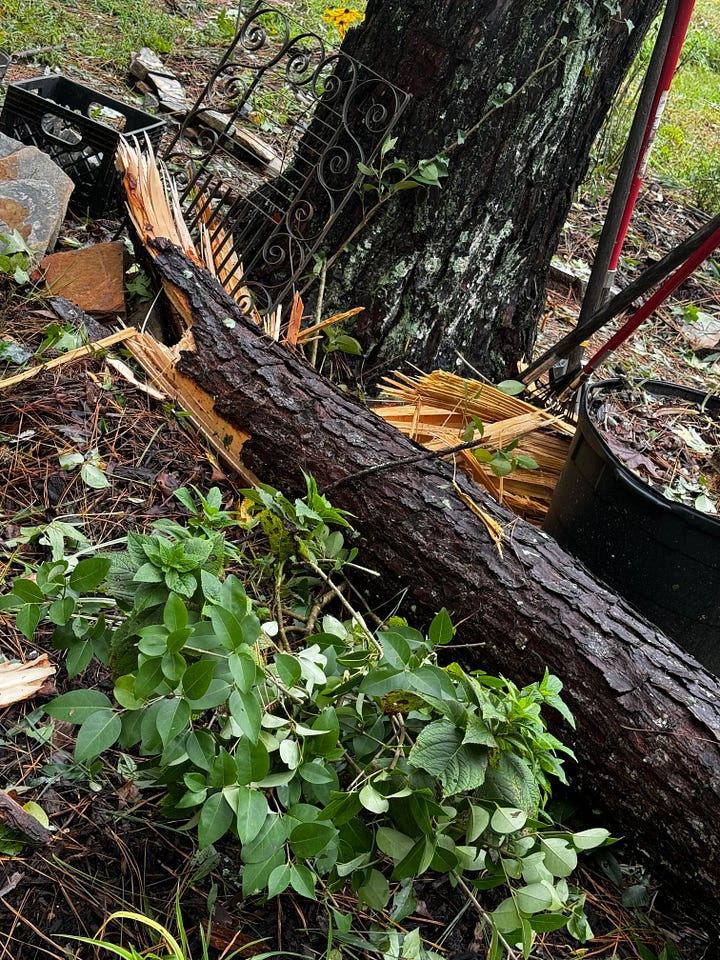For seven days the stars over our meadow burned with a vivid luminescence I hadn’t seen in more years than I can count. Venus was a bright pure white, the moon only a sliver, and there were so many stars—more than I can recall seeing in years and in so many colors! Baleful, pulsing red. Electric blue.
For seven days, we had no power, no internet, no television. Which meant no light pollution to dim the show up in the sky. Also, no connection with the outside world—apart from the drama outside our front door…





… and at my college…





In the coming days, I’ll have more to say about the weight of this experience, my first major hurricane since getting trapped in Baton Rouge for Hurricane Andrew in 1992. Sustained winds from Helene had dropped to around 50 by the time the storm got to my corner of South Carolina, but gusts in our area clocked at 70 mph, nearly hurricane force. These, ironically, were roughly the same as Andrew’s wind speeds, except Baton Rouge is only an hour as the pelican flies from the Gulf of Mexico, while Helene wreaked this havoc nearly nine hours and 500 miles from Perry, Florida.

This map of Helene’s path also connects a series of villages and small towns that contain the people I love most in the world—Valdosta, Augusta, Greenwood, Spartanburg, Brevard, Asheville, Franklin. For days, I didn’t know their fates. And no, I didn’t lose anyone—but thinking of those who did is another form of wrecking… the tides of grief storm, then overtop, the barricades of my stoicism and … suddenly I am a lake filled with matchsticks that once were houses.
We had no idea.
We weren’t prepared.
The focus in the media is on Asheville, Chimney Rock, Black Mountain, all those hills and hollers in western North Carolina—as it should be. One day, I’ll write about how a group of iHeart radio stations in Upstate South Carolina and Western North Carolina became a lifeline for country people and country towns with no newspapers or television stations to bring them essential news.
The day after Helene, with power and cell towers knocked out of commission for a four-state region, most radio stations stuck implacably to the job of pumping out hits or pre-recorded prayers and programming. Meanwhile, the folks at “Whistle 100” and “Kiss Country” stepped up for community in a big way, turning the airwaves over to the people in the disaster zone in a forceful reminder that media can put people over profits and fulfill their constitutional role—when they want to.
Of course, I got a big dose of “let’s go, Brandon” politics and “they can control the weather” conspiracy mingled in with the helpful advice, harrowing rescues, and pleas to the public. And that will eventually lead to something else I have to say… about the clash between this region’s retrograde belief systems and the climate chickens that came home to roost on September 27th.
“The HELL it’s not climate change!” Those words came courtesy of a tiny woman with fading red hair as she dressed down a man twice her height in the customer service line at the Newberry Lowe’s. She expressed my own thoughts so perfectly I wished I’d filmed the encounter and posted it on TikTok. See? See? This!
But right now I’m weary from a week of fighting with chainsaws and generators, cooking on a grill, bathing on the porch, and boiling water for what felt like upwards of four hours a day. I’m worn down from dodging downed trees and power lines. I’m worn out from the images stuck in my brain. The pinched expression on the face of the woman parked at the QT. She was all of 30—maybe—with three small children and a dog piled into a small blue sedan. I’d given up and was driving off, while she still waited for the promised arrival of the gas tanker. Oh, yes, and the woman who averted her face in shame as she entered the Food Lion clad in her pajamas. For a moment I was startled, then when a child in pajamas raced to her side, and I looked up to see another woman and child, also in pajamas, I got it. This was no sleepover. This was more of that parade of tired people, dirty people, shocked people, sad and diminished people I’d been silently passing all week. I know what I see in these faces—maybe they see it in mine, too. We are people living with the knowledge that we will clean up the mess, but the suffering will go on and on.
The lights came on very early Friday, seven days after they went out—breaking my Baton Rouge record of five days without power. The wifi came back Friday late that evening and with it a storm of notifications from my phone and social media accounts.
The blazing stars overhead are dimmed once again, because the light at the utility pole is back on. Oh, how I welcome it. But the way of life it represents… seems more and more to be on borrowed time.




Wonderful observations about life in this strange time. I wish every town had its own radio station dedicated to its community. Thanks for writing.